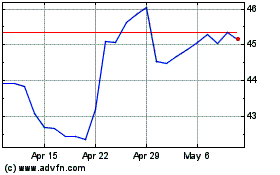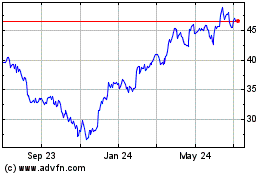Grappling with poor margins and scandal, German auto maker to
chart a course change
By William Boston
BERLIN -- Volkswagen AG Chief Executive Matthias Müller plans to
unveil a sweeping restructuring Thursday, the broadest overhaul of
the company in decades and part of the car maker's effort to get
past its emissions crisis in part by moving aggressively into
electric vehicles, self-driving cars and digital mobility
services.
Mr. Müller aims to streamline a company that sells more than 10
million cars annually, operates more than 100 factories from China
to Chattanooga, Tenn., and employs more than 600,000 people yet
chronically lags behind the profitability of its main rivals,
Toyota Motor Corp. and General Motors Co.
"We have to catch up with the best," Mr. Müller told a gathering
of the company's top executives last month, according to excerpts
from his comments seen by The Wall Street Journal.
The former Porsche chief took the reins of its parent company in
September, after his predecessor and onetime mentor, Martin
Winterkorn, resigned under pressure in the wake of the disclosure
by U.S. authorities that Volkswagen had rigged diesel engines to
cheat on emissions tests.
Mr. Müller's plan, dubbed "Strategy 2025," aims to fix some of
the company's sluggish businesses, such as the namesake Volkswagen
brand, which generates a tiny profit, and try to squeeze
cost-savings from the broader group by capitalizing on the
company's scale and product range.
Volkswagen has begun implementing some of the strategy goals
that will be outlined in more detail in the plan, Mr. Müller has
said, such as accelerating development of digital technology,
self-driving cars and electric powertrains to confront the
challenges posed by tech rivals such as ride-hailing service Uber
Technologies Inc. and Alphabet Inc.'s Google, which is developing
self-driving cars.
"Looking ahead, the car won't be our only core product for much
longer. Our core product, our promise to people, is mobility," Mr.
Müller said recently as he unveiled a $300 million investment in
Israeli ride-hailing app GETT.
Under pressure from regulators to cut greenhouse-gas emissions,
Volkswagen plans to boost its offering of battery electric and
plug-in hybrid electric vehicles to 20 models by 2020. The company
now makes three battery electric cars and six hybrids. Volkswagen
is targeting sales of 1 million electric vehicles a year by
2025.
Shortly after he took command, Mr. Müller hired an Apple Inc.
executive, Johann Jungwirth, as the company's new Chief Digital
Officer. Mr. Jungwirth is building a team that will have about 100
members tasked with redesigning the interior of the car to improve
the passenger experience in an age of digital services and
self-driving cars.
"We can learn a lot from Amazon," Mr. Jungwirth said.
Volkswagen plans to make GETT the nucleus of a new
mobility-services unit, one of the first major strategic moves by
Mr. Müller as CEO. The unit is expected to be based in Berlin, at
arm's length from headquarters in Wolfsburg and close to the city's
thriving tech scene.
The acquisition is a small financial step but a leap for
Volkswagen, which until the diesel crisis tended to only pay lip
service to electric vehicles and technology that is reshaping the
auto industry.
"Before Diesel-gate we were already on the move, but there was
an additional push after the new board was put in place," said Ole
Harms, who will run the new mobility business.
Mr. Müller's new strategy overhauls the plan put in place by Mr.
Winterkorn in 2007, which aimed to make Volkswagen the biggest and
most profitable car company in the world by 2018. Volkswagen
overtook Toyota as the biggest car maker by sales briefly last year
and again in the first three months of this year.
In his quest for global dominance, Mr. Winterkorn invested
heavily in new plants to achieve global scale but took his eye off
profits, analysts said. In developing his new strategy, Mr. Müller
has repeatedly emphasized that size alone doesn't matter.
"It just cannot be that an enterprise that sells 10 million
vehicles a year is not able to leverage the scale and savings to
the extent that it should be possible," he told executives last
month.
One suggestion on the table is to combine the various component
manufacturing activities of the 12 brands into a single business
unit that serves the entire group. Many of the brands share
components, including volume brands Volkswagen, Skoda and Seat, and
premium brands Audi, Porsche and Bentley.
Analysts think Volkswagen could achieve considerable savings by
combining the components business, but the proposal has also met
opposition at Audi, according to people familiar with the
situation.
Write to William Boston at william.boston@wsj.com
(END) Dow Jones Newswires
June 16, 2016 02:48 ET (06:48 GMT)
Copyright (c) 2016 Dow Jones & Company, Inc.
General Motors (NYSE:GM)
Historical Stock Chart
From Mar 2024 to Apr 2024

General Motors (NYSE:GM)
Historical Stock Chart
From Apr 2023 to Apr 2024
